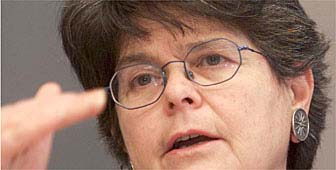
Health insurance law “partial failure” says Dreifuss

Switzerland’s six-year-old health insurance law is a “partial failure”, according to the interior minister, Ruth Dreifuss.
Presenting a report on the law’s impact on Monday, Dreifuss said it had failed to rein in costs, but that it had guaranteed quality healthcare and a fairer distribution of the financial burden.
Billions of francs
The cost of healthcare jumped from SFr34 billion ($20.83 billion) to SFr41.6 billion between 1994 and 1999.
“The law didn’t live up to expectations concerning costs,” said Dreifuss, who wants to redefine the legislation. The Federal Social Security Office plans to propose a number of cost-cutting measures in the near future.
A special fund could be created to take over the cost of expensive treatments above SFr40,000. The number of doctors could also be restricted for three years.
Santé Suisse, an association which represents health insurance companies agrees with Dreifuss that something needs to be down to keep down the cost of premiums.
“There are no measures which help to contain the costs that’s why they’re growing unpredictably.” Nicole Bulliard, a spokeswoman for the association told swissinfo. “The citizens which have to pay for their health insurance just won’t be able to manage in the future.”
Helping families
Families, however, may benefit from lower insurance premiums if the interior ministry goes ahead with plans to use SFr500 million ($306 million) in unused federal subsidies to reduce children’s premiums.
The project could save a family with two children up to SFr600 per year. The government and parliament will decide whether to go ahead in early 2002.
But Bulliard believes that a closer look at the cost of pharmaceuticals could help drive down premiums for everyone.
“We have noticed that the cost of medicine accounts for 11 per cent of the total increase in health insurance [prices] for last year,” she said.
Bulliard says that measures are needed to better monitor the price of medicines two or three years after their release into the market place.
“We should better control the evolution of the price [of drugs] over the years,” Bulliard told swissinfo. “For about ten years new medicine is protected and a price is set for that period of time. This price should not be set for so long. It needs to be lowered or re-calculated over time.”
Dreifuss addressed this issue in her report suggesting that the efficiency, the appropriateness and the price of a drug should be re-examined two years after its addition to the prescription pharmaceuticals list. The price should then also be adjusted after a wider comparison with other European countries.
Basic cover
Dreifuss refused to consider reducing the benefits covered by basic compulsory insurance. “It would be inappropriate and dangerous,” to do so, she said.
“Dangerous because if we didn’t keep pace with medical developments there would be one kind of healthcare for rich people and another for the less well-off part of the community. And inappropriate because reducing the benefits would not actually cut down significantly on the number of medical acts.”
Dreifuss wants to regulate access to medical benefits. A second medical opinion could become compulsory for some high-cost operations, such as tonsil removal and the treatment of varicose veins.
The aim of the project is to limit medical intervention to those procedures which are necessary and to reimburse what the insured actually need.
swissinfo with agencies

In compliance with the JTI standards
More: SWI swissinfo.ch certified by the Journalism Trust Initiative



























You can find an overview of ongoing debates with our journalists here . Please join us!
If you want to start a conversation about a topic raised in this article or want to report factual errors, email us at english@swissinfo.ch.